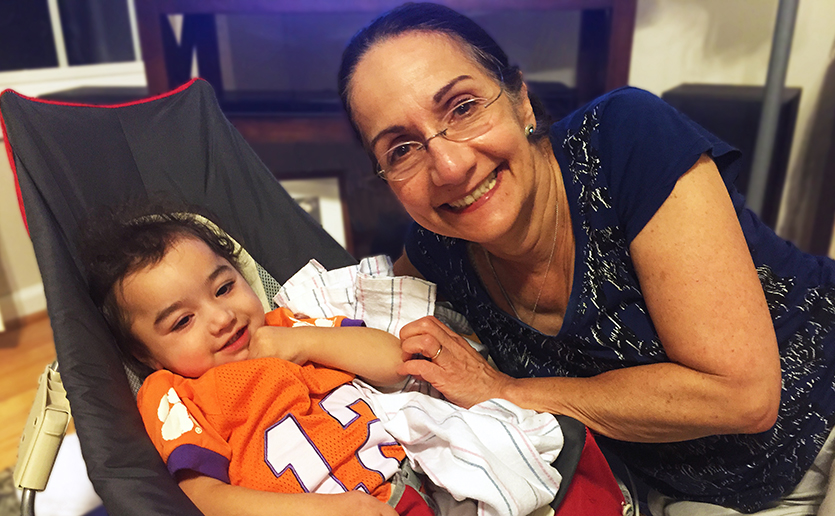
For decades, researcher Marian DiFiglia, PhD, has investigated neurodegenerative diseases at Massachusetts General Hospital. Then, three years ago, her grandson Quinn was diagnosed with a genetic mutation so rare that, at the time, it had no name.
Doctors used medications and diet to help control [seizures], but Quinn never learned how to sit up, move his arms or talk.
Coming to grips with the genetic mutation involved was a life-changing experience for Dr. DiFiglia, her daughter, Liz Aronin, and son-in-law, Jamie Mills.
Like the diseases Dr. DiFiglia studies, Quinn’s condition affects his ability to control his mind and body. When he was seven months old, Quinn began having seizures. Doctors used medications and diet to help control them, but Quinn never learned how to sit up, move his arms or talk.
Diagnosing the Genetic Mutation
In 2016, when Quinn was 2 years old, his disease was given a name: NACC1. His case was part of a breakthrough research paper from the Undiagnosed Disease Network at Duke University. He was one of seven known children in the world to have the genetic mutation. Today, at least 19 people are known to live with the disorder.

Liz and Jamie connected with other NACC1 families online. A common concern among them were their children’s bouts of agitation, which could last for weeks.
Quinn has been miserable at some birthday parties and family trips because he wasn’t feeling his best, which makes those events challenging for his parents.
“On days when Quinn is agitated, nothing we do helps,” Liz says. “Emotionally, we fall apart.”
There are good days when Quinn, now 5, enjoys laughing with his siblings, twins 6-month old Emmaline and Jack, and 2-year-old Josie, and going on outings to the park and pool.
“On days when he is happy, life does seem doable,” says Liz, a nurse practitioner who cares for HIV patients, “but there is always some underlying sadness that Quinn is not developing as he should be.”
A Loving Grandmother
Dr. DiFiglia and her husband, Neil Aronin, MD, frequently travel to Durham, North Carolina, to visit family and spend time with Quinn. She loves to snuggle with him and helps with his care needs, like giving him a bath.
In the beginning, Dr. DiFiglia felt overwhelmed by Quinn’s health issues. And then an idea came to her. As director of the Laboratory of Cellular Neurobiology at the Mass General Institute for Neurodegenerative Disease, she could do something for children with NACC1.
“I can fundraise,” she recalls thinking, “and I can do science!”
A Determined Scientist
Having spent nearly 40 years studying Huntington’s disease — a fatal neurodegenerative condition that strikes people midlife — Dr. DiFiglia started to look more closely at the characteristics shared by Huntington’s and NACC1.
“These donations have made a huge impact in getting research started and I plan to make every penny count.”
Both disorders affect the brain and are caused by a genetic mutation. With enough funding in place, her goal is to try approaches that have worked to advance Huntington’s research on NACC1.
Because money is tight for research, especially for rare genetic mutations, Dr. DiFiglia took on fundraising with her family.
They became part of Mass General’s BeCause community. BeCause is a group of friends and supporters who fundraise by organizing and participating in events, social gatherings and online campaigns.
Through their BeCause campaign, Liz and Jamie and other families have raised more than $120,000 to help advance Dr. DiFiglia’s research.

With fundraising support and help from collaborators and a graduate student, Dr. DiFiglia has been able to model the NACC1 disease in mice, which is one method scientists use to explore possible treatments.
She believes this is the first NACC1 mouse model in the world.
Her hope now is to hire a postdoctoral researcher to collect preliminary data needed to apply for funding from foundations and governmental agencies to further support her NACC1 research.
“Addressing the problems caused by the NACC1 mutation is on my mind every day,” Dr. DiFiglia says.
“I know patients and families living with this disorder are counting on me and other scientists. Cases have been found all over the world and already people have been so generous. These donations have made a huge impact in getting research started and I plan to make every penny count.”
Dreams for Quinn’s Future
Liz and Jamie say their love for Quinn is boundless and they feel thankful that their family has the resources to care for him. Their dream for Quinn is to reduce his pain and help him better communicate his needs. Right now, he is working on raising his eyebrows to indicate “yes” and raising his eyebrows and shaking his head to indicate “no.”
Jamie is hopeful about what NACC1 research may uncover. “I’d like Quinn to sit up on his own and walk a little bit,” he says. “And, I’ve often longed to hear him say, ‘I love you.’”
To learn more about Dr. DiFiglia’s NACC1 research or make a donation, please visit their online campaign website.
For additional information about how you can hold a fundraiser for Mass General, please visit our BeCause website.



